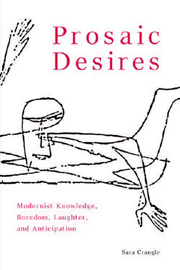3 - Inclining Towards Laughter
Published online by Cambridge University Press: 12 September 2012
Summary
The “Aeolus” episode of Ulysses is concerned with air and its passage. Gusts batter the office of the Freeman's Journal from outside, and from within, where among the odd “sudden screech of [Ned Lambert's] laughter,” a group of men make blustery, portentous claims about everything from individuals only tenuously known to Irish history (156). Stephen Dedalus takes away Mr. O'Madden Burke's breath with his suggestion that they adjourn to Mooney's, along the way contributing his own long- winded account to the proceedings. The story Stephen tells he describes as his “vision,” later titling it A Pisgah Sight of Palestine or the Parable of the Plums. His tale involves two elderly spinsters who decide they want to view Dublin from the top of local landmark, Nelson's Column. The description of their trip is absurdly involved, including an extended period of financial saving, the prying of said savings from a money box, and, on the day of the journey, the purchase of bread, brawn, and two dozen plums to sustain the women through their climb. Eventually, in a further mention of air and its travels, the women pant up the column, “peeping at the airslits” (184). At the top, they teeter precariously near the edge, almost overcome with vertigo, then sit down and eat, “spitting the plumstones slowly out between the railings.” At this point in his narrative, Stephen “g[ives] a sudden loud young laugh as a close.”
- Type
- Chapter
- Information
- Prosaic DesiresModernist Knowledge Boredom Laughter and Anticipation, pp. 104 - 138Publisher: Edinburgh University PressPrint publication year: 2010



